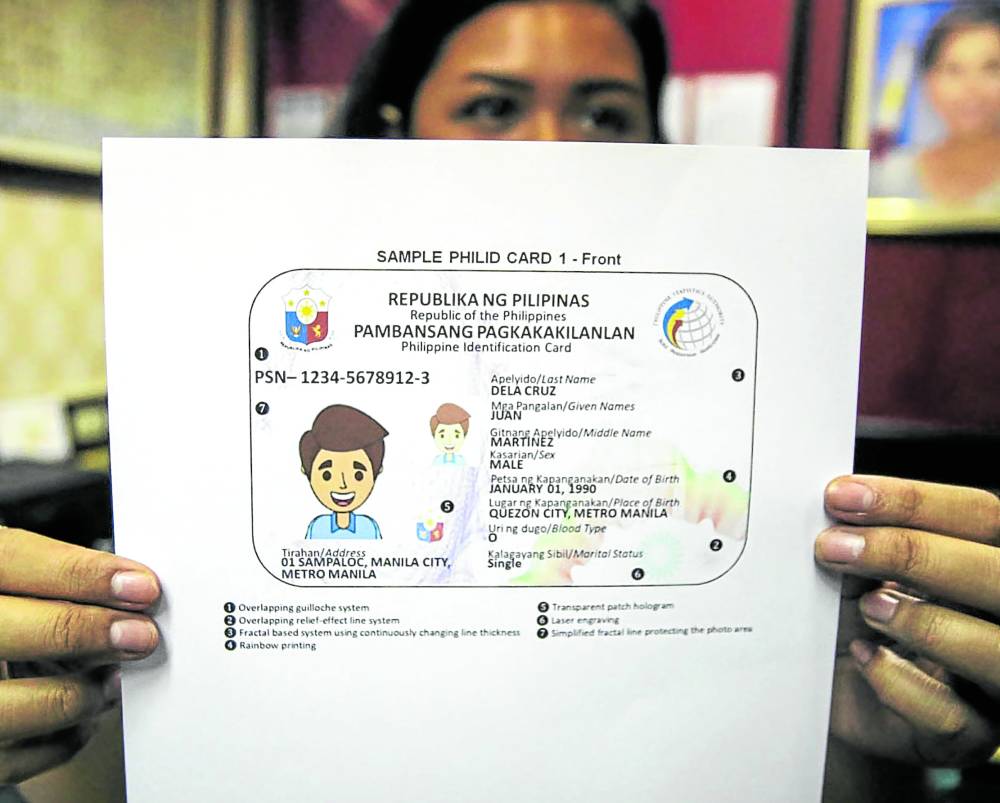BSP seeks P641-M reparation from fired national ID supplier

FILE PHOTO: A congressional worker shows a sample of the PhilSys ID presented to the House of Representatives when the Philippine Statistics Authority was seeking funding in October 2022. INQUIRER FILES
MANILA, Philippines — The Bangko Sentral ng Pilipinas (BSP) has terminated its contract with AllCard Inc., the supplier under the Philippine Identification System (PhilSys) of the government, for failing to deliver its obligations under the deal, which caused delays in the production and delivery of national ID cards.
In a termination notice dated Aug. 15, a copy of which was seen by the Inquirer, the policy-making Monetary Board (MB) ended the BSP’s contract with AllCard for its “failure to deliver any or all of the goods specified in the contract, amounting to more than 10 percent of the contract price.”
The MB also authorized its chair, BSP Governor Eli Remolona Jr., to issue a blacklisting order that would disqualify AllCard from participating in future biddings for all government projects.
The central bank said only 57.9 million prepersonalized national ID cards were actually produced between 2022 and 2023, 58.1 million short of the target of 116 million cards for Filipinos.
Production loss
This resulted in a production loss of P1.06 billion, equivalent to 49.91 percent of the P2.1-billion contract awarded to AllCard, it noted.
Article continues after this advertisementRemolona earlier said the central bank is now looking for a new supplier while “negotiating” compensation for damages. Separately, BSP Senior Assistant Governor and General Counsel Elmore Capule told the Inquirer on Thursday that the matter is now under arbitration.
Article continues after this advertisementBSP computations showed AllCard must pay P640.9 million in total liquidated damages, or equivalent to 30.24 percent of the contract price.
“This is a real problem. We have decided to terminate the old contracts because the contractor for these IDs has not been able to deliver,” Remolona said. “We’re working on that issue.”
Contract violations
Under the now-terminated deal, the BSP hired AllCard for the “supply, delivery, installation, and commissioning” of the card production equipment for three years.
The agreement included providing technical and maintenance support and training workers at the BSP and the Philippine Statistics Authority (PSA), the lead agency for the national ID program.
AllCard was also tapped to supply and deliver raw materials, consumables, and wear-and-tear spare parts enough to sustain day-to-day operations to produce 116 million pieces of national ID cards.
But the BSP said AllCard “failed to deliver enough raw materials within the specified period, even within the extension granted.”
READ: BSP terminates contract with national ID cards supplier ACI
The central bank also flagged “prolonged” downtimes of production machinery due to “unavailable” spare parts.
The central bank added that AllCard failed to perform its “other obligations,” including compliance with valid instructions and the timely submission of a “comprehensive and realistic” catch-up plan.
Ultimately, the BSP said AllCard “effectively abandoned the contract” and incurred almost a 7-percent wastage that “grossly” exceeded the 1-percent maximum allowable limit.
Roy Ebora, president of AllCard, said the company has appealed the decision of the MB.
Digital version
In 2018, then-President Rodrigo Duterte signed into law the Philippine Identification System Act.
Legislators at the time said the law would cut red tape and provide the public with additional protection against terrorism and other security threats.
Prior attempts to establish a single national identification system in the country faced legal setbacks and privacy concerns.
When the pandemic struck in 2020, Duterte ordered the ramping up of the PhilSys card rollout to aid in identifying the poorest households entitled to government cash aid during the long lockdowns.
The delays in the printing and delivery of the actual IDs due to insufficient data from Filipinos needing to register and design changes prompted the government to ramp up the issuance of the ePhilID, which is the digital version of the physical national ID card that is sent through the PhilPost system.
The PSA said that, as of April this year, it had successfully delivered 50.06 million national IDs across the country, while 45.16 million ePhilIDs — both printed and downloaded — had been issued.